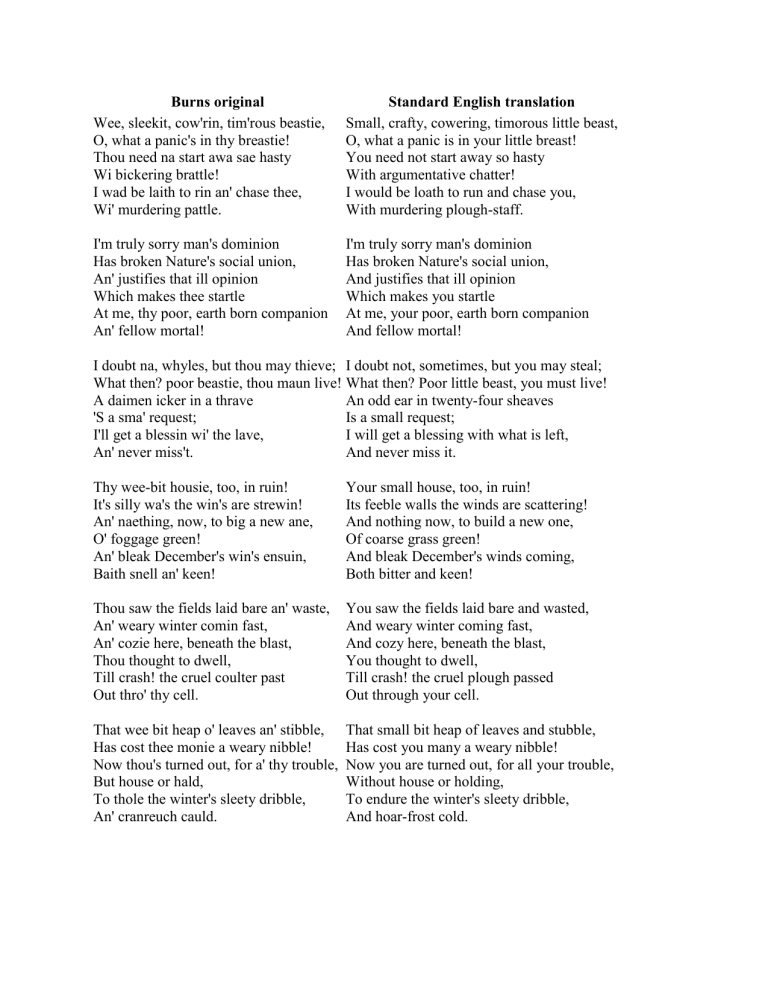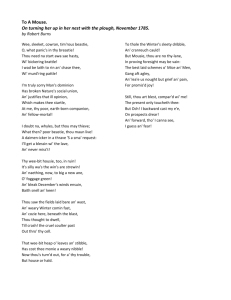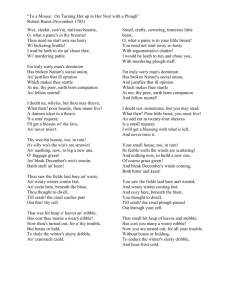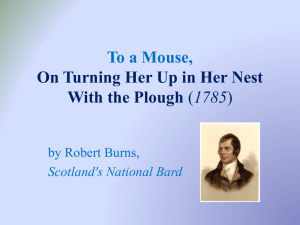Burns original Standard English translation Wee, sleekit, cow'rin, tim

Burns original
Wee, sleekit, cow'rin, tim'rous beastie,
O, what a panic's in thy breastie!
Thou need na start awa sae hasty
Wi bickering brattle!
I wad be laith to rin an' chase thee,
Wi' murdering pattle.
Standard English translation
Small, crafty, cowering, timorous little beast,
O, what a panic is in your little breast!
You need not start away so hasty
With argumentative chatter!
I would be loath to run and chase you,
With murdering plough-staff.
I'm truly sorry man's dominion
Has broken Nature's social union,
An' justifies that ill opinion
Which makes thee startle
At me, thy poor, earth born companion
An' fellow mortal!
I'm truly sorry man's dominion
Has broken Nature's social union,
And justifies that ill opinion
Which makes you startle
At me, your poor, earth born companion
And fellow mortal!
I doubt na, whyles, but thou may thieve; I doubt not, sometimes, but you may steal;
What then? poor beastie, thou maun live! What then? Poor little beast, you must live!
A daimen icker in a thrave An odd ear in twenty-four sheaves
'S a sma' request;
I'll get a blessin wi' the lave,
An' never miss't.
Is a small request;
I will get a blessing with what is left,
And never miss it.
Thy wee-bit housie, too, in ruin!
It's silly wa's the win's are strewin!
An' naething, now, to big a new ane,
O' foggage green!
An' bleak December's win's ensuin,
Baith snell an' keen!
Your small house, too, in ruin!
Its feeble walls the winds are scattering!
And nothing now, to build a new one,
Of coarse grass green!
And bleak December's winds coming,
Both bitter and keen!
Thou saw the fields laid bare an' waste,
An' weary winter comin fast,
An' cozie here, beneath the blast,
Thou thought to dwell,
Till crash! the cruel coulter past
Out thro' thy cell.
You saw the fields laid bare and wasted,
And weary winter coming fast,
And cozy here, beneath the blast,
You thought to dwell,
Till crash! the cruel plough passed
Out through your cell.
That wee bit heap o' leaves an' stibble,
Has cost thee monie a weary nibble!
That small bit heap of leaves and stubble,
Has cost you many a weary nibble!
Now thou's turned out, for a' thy trouble, Now you are turned out, for all your trouble,
But house or hald,
To thole the winter's sleety dribble,
An' cranreuch cauld.
Without house or holding,
To endure the winter's sleety dribble,
And hoar-frost cold.
But Mousie, thou art no thy lane,
In proving foresight may be vain:
The best-laid schemes o' mice an' men
Gang aft agley,
An' lea'e us nought but grief an' pain,
For promis'd joy!
But little Mouse, you are not alone,
In proving foresight may be vain:
The best laid schemes of mice and men
Go often awry,
And leave us nothing but grief and pain,
For promised joy!
Still thou are blest, compared wi' me!
The present only toucheth thee:
But och! I backward cast my e'e,
On prospects drear!
An' forward, tho' I canna see,
I guess an' fear!
1. Summarize the plot of the poem. What has happened and what is the farmer’s reaction?
2. Look at lines 39-40. This is the section from which Steinbeck borrowed the title of his novel. In your own words, describe Burns’ message in these two lines. Why was the phrase “of mice and men” an appropriate choice for Steinbeck’s novel?
3. Explain how Burns’ message in lines 39-40 is true for:
George
Lennie
Candy
Crooks
Curley’s wife
4. In the poem, what time of year is it? Why is this a concern for both the man and the mouse?
Symbolically, what’s interesting about this turn of weather and how does it connect to the theme you discussed in #2 above?
Still you are blessed, compared with me!
The present only touches you:
But oh! I backward cast my eye,
On prospects dreary!
And forward, though I cannot see,
I guess and fear!
5. Look at the final stanza. Who feels more pain, the farmer or the mouse? Why?
6. Do you agree with Burns’ and Steinbeck’s message about plans and dreams? Explain your answer.
7. Despite our awareness that many dreams are never realized and many plans are defeated, people still continue to dream and hold onto hope. Why do you suppose people do this?









